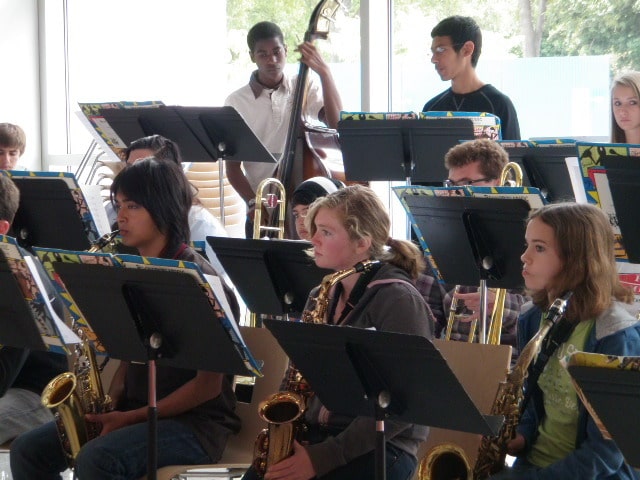Any piano teacher with young students can tell you how challenging it is to retain their teenage students. Kids always seem to be fully engaged when they are younger, but this quickly changes when they hit their teenage years.

There’s a whole lot of reasons why this occurs, as discussed by Alejandro Cremaschi:
Premature lesson dropout is a concern because students who quit lessons prematurely may not be able to experience the long-term benefits of music making. Research shows that teachers attribute lesson attrition to student’s loss of interest, heavy schedules and lack of parental support. Adults who quit lessons as children often cite dissatisfaction with the materials they studied, lack of fun, loss of interest in practicing and a low self-concept in music. Via Research Gate
It can be very frustrating for their teachers when they have to watch as years of investment, time and effort go down the drain. To add to that, as a teacher, you fully appreciate your students’ need for music, even when they don’t recognize this need themselves.
Andrea, a music teacher with years of experience working with teens offers 7 habits she believes will help teachers keep their teenage students engaged:
- Openness
As a teacher, it is important to provide a safe environment where teens don’t have to feel like they have to lie to get around you even when they’re not at their best. This helps you know exactly where they are at and your goals and theirs become more aligned.
My teens know they can come in and say “I didn’t even open a book this week” without feeling as though they have to make excuses or feel guilty. And I know I can say “Yes, that piece is great, but you’re not quite ready for it.” without feeling as though I’m going to hurt their feelings or discourage them. Via Teach Piano Today
- Choosing what they play
A lot of teachers struggle with finding the right balance between what they want their students to play versus what their students actually want to play.
For teens to feel as though they are progressing and becoming more proficient at the piano, they need to be challenged. And spreading their wings when it comes to musical tastes and experiences is the challenge they need. However, this challenge doesn’t always have to come from you! Encourage your teens to seek out material that they find interesting and motivating… and that is beyond the typical “Top 40”. Via Teach Piano Today
- Group effort

A crucial motivating factor for teens is the relationships they have with their peers. Those who stick to their piano lessons have in most cases found a way to turn their musical skills into a social outlet.
Being a part of a school’s jazz band, accompanying the high school musical, playing in a small band of friends, accompanying singers at the school talent show, and doing duets with same-level friends are all activities that make the piano an indispensable part of teenage life (and that make practice something that is not a chore). Via Teach Piano Today
- Setting achievable short-term goals
Teenagers are quick to lose interest in anything, so it’s important to ensure that piano lessons are consistently relevant – which means finding ways to make them immediately applicable.
Are they interested in making money in the summer playing for weddings? Do they want to audition at their university? Do they have dreams of teaching piano themselves? Do they want to play in their church? Do they have a youtube channel where they share their original compositions or covers of favorite songs?
Having a very real reason for taking piano lessons is important. Sometimes piano students come up with these goals on their own, but often they need a little nudge… and it’s often up to me to provide that inspiration. Via Teach Piano Today
- Always listening to music
Encouraging your students to listen to a wide variety of music – even music they would not typically listen to will help them have repertoire selections they are familiar with in addition to providing the exposure they need to trigger their creative genius.
- Creativity
There’s nothing as motivating as one’s own creativity. Once this is achieved, you’ll never have to ask your students to practice – you might have to ask them to slow down.

Encourage composing, improv, and just plain old “noodling” on the keys. Having them “play easy stuff for enjoyment” on the piano is also really important. In fact, I often will write PES on my students’ weekly assignment page (“Play Easy Stuff”). It’s an invitation to just sit at the piano and enjoy playing without any mental challenge involved. After all, any time spent on the piano bench is a good thing. Via Teach Piano Today
- Challenges
Allowing teens to work below their potential is a surefire way to ensure they lose interest. It’s your job to encourage them to explore and grow and be their cheerleader all through.
In fact, if your teen students are given a challenge, and if you show them that you believe they are completely capable of meeting that challenge, then you actually increase their commitment to the piano (not decrease it as I was afraid would happen). Via Teach Piano Today
Featured Image: Image Credit
Teenager stuns mall shoppers with incredible piano performance https://t.co/Fi9nbXtqjF pic.twitter.com/Vy6RgxgFxx
— TODAY (@TODAYshow) January 25, 2016
Every time I see a Piano I want to learn to play, walking through the hotel lobby and saw one, couldn’t resisthttps://t.co/37rsnlxHfp
— Lewis Hamilton (@LewisHamilton) January 22, 2016
Related Articles:
How to Motivate Teenagers to Play the Piano
Ask your teenage students what they want to play. I know this sounds simple, but it’s surprising how many students are never asked what music they would like to play. Now I’m not saying you should let them have free reign to choose everything they play (but that sometimes works as well). I am saying that students will likely show more interest in playing something they want to play, and may want to put more time and effort into practicing the piece because it is their idea. They have great ideas and should be listened to. They do know what they like and don’t like and should be allowed to voice their opinions on the subject. Via Music Motivation
Life-Long Music Literacy for Your Tween or Teen
I have always had a warm spot in my heart for my tween and teen piano students. I began my own lessons when I was in sixth grade and I think that this “older child” stage of life is a perfect time to learn piano.
My goal as a piano teacher is always to help tweens and teens become life-long piano players.
As a parent you have probably read articles about the many benefits of listening to music. Learning to actually play and create music is even more beneficial for your tween or teen’s development. Via Byrne Piano Lessons
3 Super Cool “Brain Breaks” Your Teen Piano Students Will Love
Do you ever feel as though you pull out all the stops for your young piano students, but when your teenage kids hit the bench the magic disappears?
With your younger kids you’re using play dough, large foam dice, puppets, drums, floor pianos… you’re Super Teacher on Red Bull! But these things don’t usually fly with teenagers… and so you’re likely at a bit of a loss as to how to keep things fresh and fun.
Well we’re here today to help with our Top 3 Teen Tested Brain Breaks so that the next time you have a teen on your bench you can pump them up with some fun. Even the quietest of teens will crack a smile with these activities. Via Teach Piano Today

